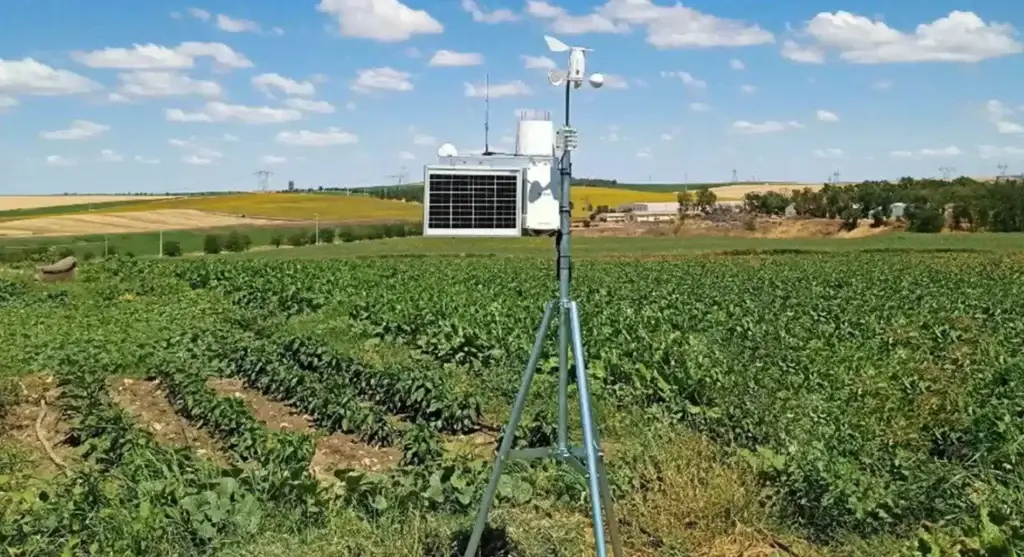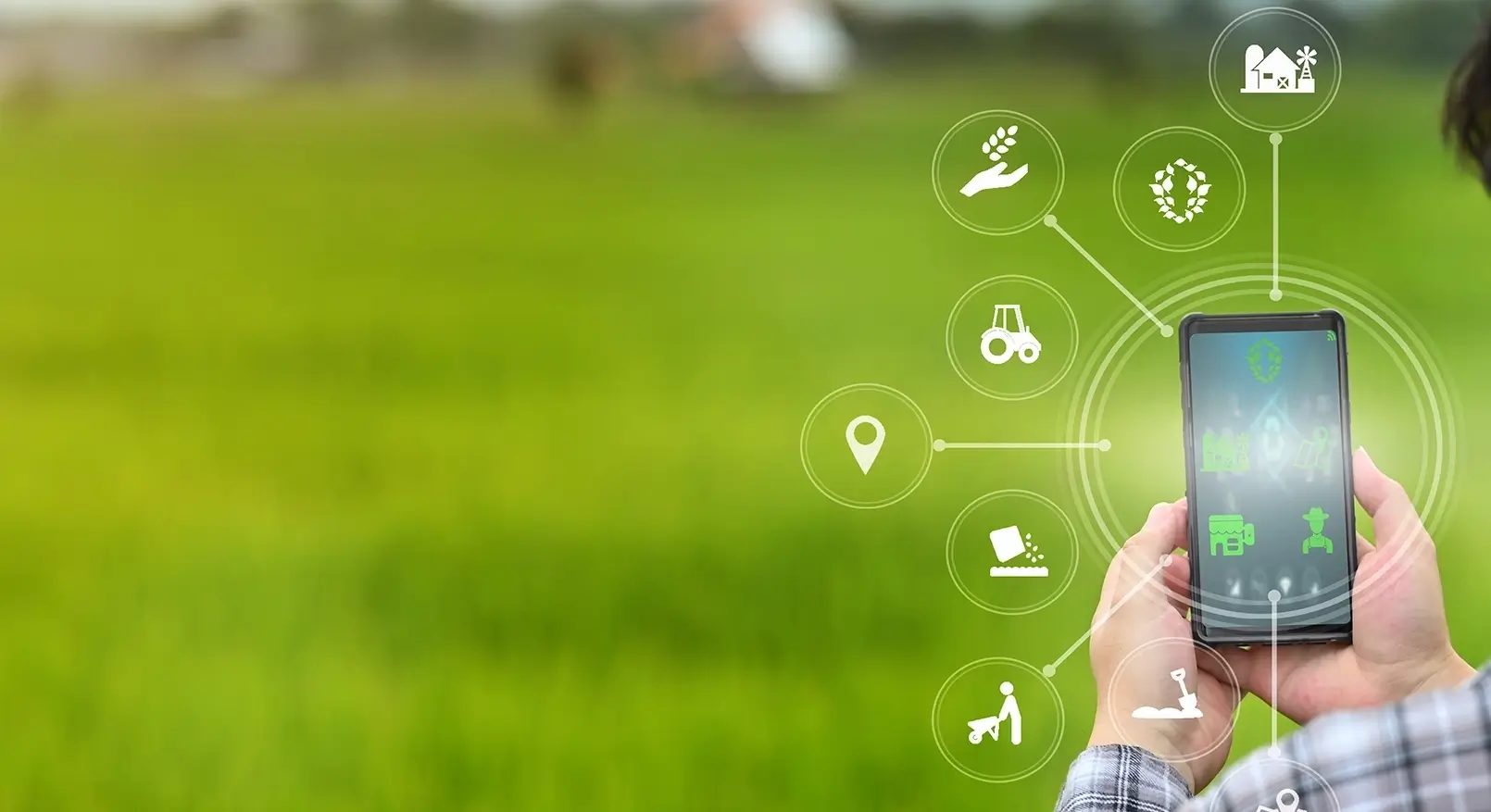Use of technology in agriculture became more crucial than ever due to the changing world and climate circumstances. Especially with the use of smart agricultural technologies, productivity increases in the agricultural field have begun to be observed.
Smart agricultural technologies generally aim to increase the efficiency of agricultural activities while reducing their costs. Sensors, satellites, data analytics, Internet of Things (IoT) and Machine Learning are the technologies supporting digital agriculture.
Thanks to these smart technologies, it is possible to increase productivity in agriculture, perform soil analysis, monitor plant health, use smart irrigation methods, manage fertilizers, and detect pests and diseases.

What is Smart Farming?
Smart farming refers to the use of smart agricultural technology to optimize farming processes by integrating digital farming solutions. These smart farming technologies involve the application of advanced tools such as IoT sensors, AI, and big data analytics to improve farm management. The goal of smart agriculture technology is to help farmers make more informed decisions regarding irrigation, pest control, and weather-related challenges. Smart farming technology allows for greater efficiency and sustainability, which are crucial in today’s agriculture.How Does Smart Farming Work?
Smart farming works by combining smart agricultural technology with climate smart agriculture technologies to monitor and control various aspects of the farm. Tools like IoT sensors, digital farming solutions, and agrometeorological weather stations collect data on soil moisture, temperature, humidity, and pest activity. This real-time data helps farmers optimize water usage, track weather changes, and prevent pest infestations. Smart farming technologies also include digital pest traps, which use climate smart technologies for agriculture to capture and monitor harmful insects. These tools work together to create a more efficient, sustainable farming system that maximizes yield while reducing resource consumption.What Technology is Used in Farming?
Farming now incorporates a variety of smart technologies in agriculture, such as climate smart agricultural technologies and digital farming platforms. These include IoT-based irrigation systems, climate smart technologies in agriculture like weather stations, and digital pest traps. By using smart farming technologies, farmers can monitor the soil, weather, and crop health in real time. This precise data helps optimize resource use, making smart technology in agriculture key to reducing waste and increasing crop yields. Climate smart farming techniques also allow for better management of climate-related risks, reducing the environmental footprint.What are the Advantages of Smart Agricultural Technologies?
Smart agricultural technologies provide numerous advantages for modern agriculture:- Increases productivity in the farming areas.
- Provides comprehensive water and fertilizer management.
- Allows detecting pests and diseases affecting plants.
- Assists less emission production.
How Does Smart Farming Improve Sustainability?
Climate smart agricultural technologies are essential for promoting sustainability in farming. By utilizing smart agriculture technology, farmers can optimize irrigation through climate smart farming practices that reduce water waste. For example, agrometeorological weather stations provide real-time weather data, allowing farmers to water crops only when necessary. Similarly, digital farming solutions help reduce pesticide usage through the use of digital pest traps, which target pests more precisely. Overall, these smart farming technologies enable more efficient use of natural resources, helping to preserve the environment while improving crop yields.
What are Smart Agricultural Practices?
Smart agricultural practices indicate how to implement smart agricultural technologies in practice. Conducting soil analysis, monitoring plant health and managing fertilizers using sensors and satellite data are some of the smart agricultural practices. While applying these practices, smart agricultural technologies like Internet of Things (IoT), data analytics, Machine Learning, sensors and satellite data are used. The application of these technologies provides various advantages that were mentioned above.How Do IoT Sensors Work in Smart Agriculture?
IoT sensors play a critical role in smart farming technologies. These sensors are part of smart technology in agriculture that monitors environmental conditions such as soil moisture, air temperature, and humidity. When used with climate smart agriculture technologies like weather stations, IoT sensors help farmers optimize irrigation and respond to climate-related challenges. These sensors are a key component of smart farming technology, as they provide real-time data that allows farmers to make informed decisions. Climate smart technologies in agriculture, including IoT-based systems, improve resource efficiency and help farmers reduce their water and fertilizer usage.How Can Smart Farming Help Reduce Water Usage?
Smart farming technologies have a significant impact on reducing water usage. By using IoT sensors to monitor soil moisture levels and integrating them with climate smart technologies in agriculture like agrometeorological weather stations, farmers can tailor irrigation schedules to the actual needs of their crops. This precise water management system, a central feature of smart agriculture technology, ensures that no water is wasted, making climate smart farming a sustainable approach in regions facing water shortages. With the help of digital farming solutions, farmers can further optimize water use, resulting in both environmental and economic benefits.What Role Does AI Play in Smart Farming?
AI plays a transformative role in smart farming technologies. By analyzing data from IoT sensors, agrometeorological weather stations, and digital pest traps, AI helps farmers make better decisions about irrigation, pest control, and crop management. AI algorithms, a key part of smart agricultural technology, predict weather patterns, pest outbreaks, and soil conditions, enabling farmers to take timely action. Climate smart agriculture technologies that incorporate AI allow for more sustainable and efficient farming practices by reducing the use of water, fertilizers, and pesticides. Digital farming solutions powered by AI also contribute to improved productivity and resource optimization.How Does Smart Farming Impact Crop Yields?
Smart farming technology has a direct impact on increasing crop yields. By using smart agricultural technology such as IoT-driven irrigation systems and digital pest traps, farmers can closely monitor and adjust growing conditions in real time. Smart technologies in agriculture provide precise data that helps farmers manage their resources efficiently, leading to healthier crops and higher yields. Climate smart agricultural technologies, such as advanced weather stations and digital platforms, further contribute by predicting the best times for planting and harvesting. These digital farming solutions allow farmers to maximize their output while minimizing inputs, leading to more sustainable and productive farming.How to Implement Smart Agricultural Technologies?
Here are different ways to use technology in agriculture in order to reach an accurate implementation:- Sensors: With the sensors used in farming areas, information such as soil moisture, soil temperature, soil pH and EC value and fertilizer adequacy are measured and this data can be analyzed and presented to farmers with data analytics software by interpreting it with Artificial Intelligence.
- Drone and Satellite Data: Information such as plant density, productivity and water content in the farming area is gathered using drone and satellite and is interpreted.
- Data Analytics: Data in farming areas is examined using data analytics software. Thanks to these software, operations such as conducting soil analysis, monitoring plant health, carrying out water and fertilizer management, determining pests and diseases can be performed.
- Machine Learning: Machine Learning increases productivity of agricultural practices and facilitates the interpretation of data. It becomes possible to determine the water needs of plants, to manage fertilizers and to identify pests and diseases through the use of agricultural algorithms.

